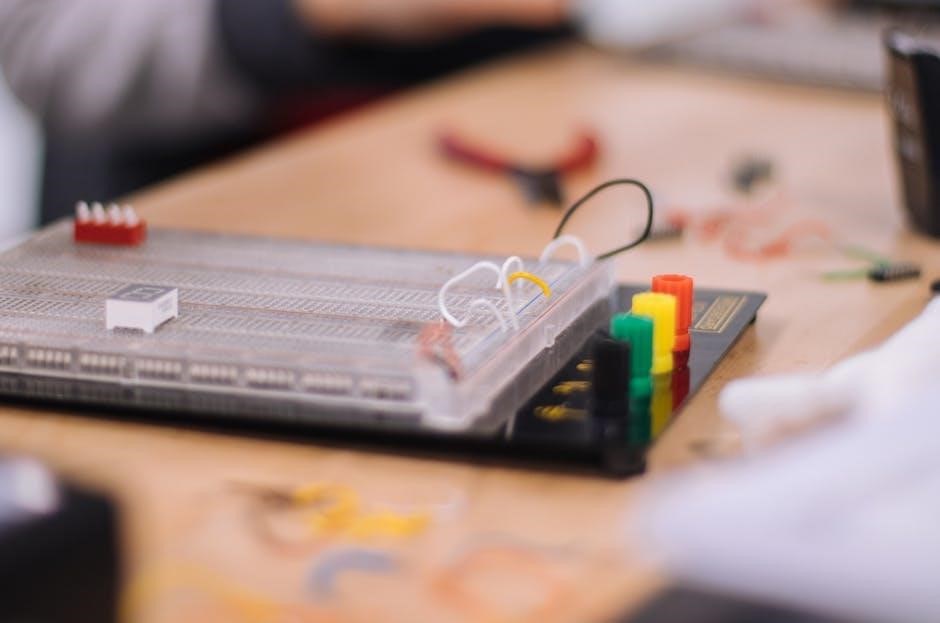DEWALT Electrical Licensing Exam Guide Overview
The DEWALT Electrical Licensing Exam Guide provides comprehensive preparation for state and local licensing exams, covering NEC standards, exam formats, and essential study strategies for electrical professionals.
The DEWALT Electrical Licensing Exam is a critical step for electricians seeking to obtain professional certification. It ensures they meet state and local standards, demonstrating expertise in electrical systems, safety protocols, and code compliance. The exam is designed for various levels, including Journeyman, Contractor, Master, and Maintenance electricians, each requiring specific knowledge and skills. It emphasizes understanding the National Electrical Code (NEC), which governs electrical installations and safety practices. Candidates must also showcase their ability to interpret diagrams, solve mathematical problems, and apply logical reasoning. Preparation is key, with study materials like the DEWALT Electrical Licensing Exam Guide offering in-depth insights and practice exams. Success in this exam not only validates professional competence but also opens doors to advanced career opportunities in the electrical field. Proper preparation and a thorough grasp of the NEC are essential for achieving licensing goals.

Understanding the Exam Structure
The DEWALT Electrical Licensing Exam is structured to assess knowledge and practical skills across multiple levels, featuring multiple-choice questions and an open-book format to evaluate NEC-based expertise.
Exam Levels: Journeyman, Contractor, Master, and Maintenance
The DEWALT Electrical Licensing Exam is divided into four distinct levels: Journeyman, Contractor, Master, and Maintenance. Each level assesses specific competencies based on professional roles. The Journeyman exam focuses on code-based knowledge and practical skills for licensed electricians. The Contractor level evaluates business and legal aspects of running an electrical contracting business. The Master exam is the most advanced, requiring deep expertise in complex electrical systems and NEC compliance. The Maintenance exam is specialized for professionals handling industrial equipment upkeep. Each level ensures candidates meet state and local licensing requirements. Understanding these distinctions is crucial for tailored preparation. The exam structure aligns with career progression, from hands-on electrical work to managerial and advanced technical roles. Proper exam selection is vital for aspiring electrical professionals to achieve the appropriate certification for their career goals.
Exam Format: Multiple Choice Questions and Open Book Policy
The DEWALT Electrical Licensing Exam features a combination of multiple-choice questions and an open book policy, designed to test both knowledge and practical application. Candidates are allowed to reference the National Electrical Code (NEC) during the exam, but this does not guarantee an automatic pass due to time constraints. The multiple-choice format requires precise understanding of electrical concepts, calculations, and code compliance. While the open book policy reduces memorization pressure, it demands strong organizational and time management skills to quickly locate relevant NEC sections. Effective preparation involves mastering key articles and sections rather than relying solely on tabbing. This format ensures candidates demonstrate both theoretical knowledge and the ability to apply it in real-world scenarios, mirroring the challenges of professional electrical work. Proper exam strategy and practice are essential to navigate the exam efficiently and successfully.

National Electrical Code (NEC) Compliance
NEC compliance is critical for the DEWALT Electrical Licensing Exam, as it ensures safe electrical practices and adherence to standardized regulations, directly impacting exam success and professional competency.
Importance of NEC in the Licensing Exam
The National Electrical Code (NEC) is a cornerstone of the DEWALT Electrical Licensing Exam, as it ensures compliance with safety standards and regulations. The NEC outlines requirements for electrical installations, equipping professionals with the knowledge to design and implement safe systems. Licensing exams heavily rely on NEC guidelines, testing candidates’ understanding of its articles and applications. Mastery of the NEC is essential for passing the exam and demonstrating competency in the field. It ensures that electrical work meets legal and safety standards, protecting both professionals and the public. The NEC is regularly updated, so staying current with its provisions is critical for exam success and professional practice. By focusing on NEC compliance, candidates can navigate complex scenarios and apply code requirements effectively, reinforcing their expertise in electrical licensing.
Key Articles and Sections to Focus On
When preparing for the DEWALT Electrical Licensing Exam, it’s crucial to focus on specific sections of the National Electrical Code (NEC). Key articles include Article 240, which covers overcurrent protection, and Article 300, detailing wiring methods. Article 310 focuses on conductors, while Article 400 addresses flexible cords and cables. Additionally, Article 406 regulates receptacles, and Article 210 covers branch circuits. Understanding Article 250, which pertains to grounding and bonding, is also essential. These sections are frequently tested and form the backbone of electrical licensing exams. Candidates should thoroughly study these areas, as they are critical for both exam success and real-world applications. Mastery of these NEC sections ensures compliance with safety standards and demonstrates professional competence in electrical work.

Study Materials and Resources
Utilize the DEWALT Electrical Licensing Exam Guide, online platforms, and practice exams to effectively prepare for the licensing exam, ensuring a comprehensive understanding of NEC standards and exam formats.
DEWALT Electrical Licensing Exam Guide Book
The DEWALT Electrical Licensing Exam Guide Book is a trusted resource offering detailed coverage of the National Electrical Code (NEC) standards; It provides comprehensive preparation for various licensing exams, including Journeyman, Contractor, Master, and Maintenance levels. The guide includes practice exams, study aids, and test-taking tips, ensuring candidates are well-prepared. It also covers essential formulas, references, and examination regulations, making it a valuable tool for electrical professionals. By focusing on key articles and sections of the NEC, the guide helps streamline study efforts. Whether you’re looking to pass state or local exams, this book is designed to enhance understanding and improve test performance. It’s a must-have for anyone aiming to succeed in their electrical licensing journey.
Online Study Platforms and Practice Exams
Online study platforms and practice exams are indispensable tools for preparing for the DEWALT Electrical Licensing Exam. These resources provide interactive learning opportunities, allowing candidates to test their knowledge and identify areas for improvement. Many platforms offer realistic practice exams that simulate the actual test environment, helping candidates familiarize themselves with the format and timing. Additionally, online resources often include detailed explanations for correct and incorrect answers, reinforcing learning. Platforms like PSI Practice Exams are highly recommended, as they focus on key NEC articles and logical problem-solving skills. Regularly using these tools helps build confidence and ensures a thorough understanding of the material. By leveraging online study platforms, candidates can enhance their preparation and increase their chances of passing the exam on the first attempt.

Exam Preparation Strategies
Effective exam preparation involves structured study plans, focusing on NEC compliance, and utilizing online platforms for practice exams. Prioritize understanding key articles and developing problem-solving skills for success.
Effective Study Techniques for Electrical Licensing
Effective study techniques for electrical licensing involve a combination of structured learning and practical application. Start by creating a detailed study plan, focusing on key NEC articles and sections. Prioritize active reading over passive skimming, taking notes on complex topics. Utilize flashcards to memorize important codes and formulas. Engage in hands-on practice by solving sample problems and reviewing past exams. Join study groups or forums to discuss challenging topics and gain insights from others. Regularly test your knowledge with timed practice exams to build exam-day confidence. Incorporate real-world scenarios to better understand theoretical concepts. Dedicate specific sessions to reviewing mistakes and strengthening weak areas. Consistency and repetition are key to mastering the material. By integrating these strategies, you can efficiently prepare for the DEWALT Electrical Licensing Exam and achieve success.
Time Management Tips for Exam Day
Effective time management on exam day is crucial for success. Start by arriving early to the test center to avoid last-minute stress. Skim through the entire exam first to identify the number of questions and allocate time evenly. Allocate more time to complex questions and less to straightforward ones. Use the process of elimination to narrow down answers for multiple-choice questions. Avoid spending too much time on a single question—mark it and return later. Keep a steady pace, and avoid rushing through questions. Use the open-book policy wisely by having key NEC sections tabbed for quick reference. Practice timed exams during preparation to build stamina and familiarity with the format. Stay calm, read each question carefully, and focus on logical progression to maximize your score within the allotted time.

Test-Taking Tips and Tricks
Master question types, use elimination for multiple-choice answers, and skip challenging questions to return later. Stay calm, read carefully, and focus on logical problem-solving to maximize accuracy and efficiency.
Understanding Question Types and Formats
The DEWALT Electrical Licensing Exam primarily features multiple-choice questions, testing knowledge of NEC codes, electrical theory, and practical applications. Open-book sections allow referencing the NEC, emphasizing quick code navigation. Questions often require logical progression, starting with simpler concepts and advancing to complex calculations. candidates should identify keywords like “minimum,” “maximum,” or “except” to pinpoint correct answers. Practice exams reveal common question patterns, such as identifying code violations or determining correct wiring methods. Time management is crucial, as some questions may require detailed calculations. Skim questions first to allocate time effectively. Focus on understanding the reasoning behind answers to improve problem-solving skills. Familiarity with question formats through practice exams enhances confidence and accuracy during the actual test. Mastering these strategies ensures better performance and reduces exam day stress.
Logical Progression and Problem-Solving Skills
Logical progression and problem-solving skills are crucial for success in the DEWALT Electrical Licensing Exam. The exam often presents complex scenarios that require step-by-step analysis, starting with identifying the problem, understanding relevant NEC articles, and applying mathematical calculations. Developing strong critical thinking abilities helps candidates break down questions into manageable parts. Recognizing patterns in question formats and focusing on key details, such as load calculations or wiring methods, enhances accuracy. Practicing realistic, code-based problems improves the ability to approach challenges systematically. Time management plays a key role, as candidates must balance detailed calculations with quick decision-making. Strengthening these skills through practice exams and real-world applications ensures readiness for the exam’s rigorous demands. Logical progression not only aids in solving problems but also boosts confidence and efficiency during the test.
